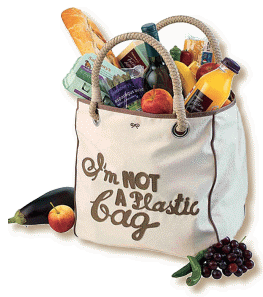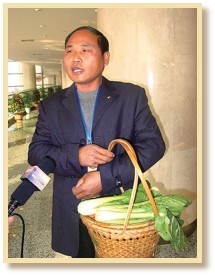| Positive
Improvements on the Planet |
|
|
Prohibiting or discouraging the use of plastic bags has become a growing international trend, another sure sign of raised consciousness on this planet.
Denmark headed the way far back in 1994 by introducing a packaging tax that had managed to reduce consumption of paper and plastic bags by 66 percent.
On opening to the West before the turn of the millennium, the Himalayan Kingdom of Bhutan, with the far-sight to protect their harmonious pristine environment and happiness and well-being of their people, as well as animals, had implemented a strict ban on plastic bags.
From 2002, action against plastics started picking up momentum to become a global movement: Ireland introduced 15 Cents “plastax” on plastic carrier bags which has led to a 90% reduction in use; Bangladesh passed a bill unanimously to completely ban the production, import, marketing, sale, display, storage, distribution, and carrying of plastic bags.
In the following years, many countries' governments, recognizing the hazardous environmental impacts caused by plastic bags, actively looked for ways to tackle the problem.
In May 2003, flimsy thin plastic bags were made illegal in South Africa, with heavy fines (about US$14,000) or 10-year jail terms waiting for those who break the law.
Malta successfully implemented an eco-taxation on the plastic bags at the beginning of Golden Year 2 (2005), and the number of plastic bags in the country had fallen by 25 million within two years.
In 2005, French parliament members unanimously voted to ban non-biodegradable plastic bags by 2010. Italy has passed a similar law for them to be banned from 2010.
In Australia, following the initiatives of several small towns in the country that had cut 45 percent plastic bag usage between 2002 and 2005, Victoria state legislation introduced a 10 cents levy on every giveaway plastic bag. The move is seen as a catalyst for a nationwide ban with New South Wales and South Australia already considering similar actions.
In India, the Himalayan Mountain state of Sikkim prides itself as the first state to have effectively implemented a complete ban on plastic bags. Other states such as Himachal Pradesh, Goa, Kerala and Karnataka all have applied similar laws. The latest addition to the list is the western state of Maharashtra, where Mumbai is situated. Their law implemented in August 2005 prohibits the manufacture, sale and use of all plastic bags. Violators face fines or imprisonment.
 |
No Plastic Bag Day' campaign in Hong
Kong successfully raised public's consciousness of reducing the
usage of Plastic Bags. |
Over the past years, the Hong Kong government has been making great efforts to reduce the use of plastic bags. Following the hugely successful ‘No Plastic Bag Day' campaign in Golden Year 3 (2006), which saw a more than 40% decrease in use at the participating retailers, the legislators are now closer to passing an environmental levy on the bags to further cut the usage by one billion in one year.
In Canada, a small town called Leaf Rapids in Manitoba recently implemented an environmentally friendly bylaw. Since April 2, Golden Year 4 (2007), store retailers are no longer allowed to give or sell single-use plastic bags, only multi-use, reusable bags are accepted. The new legislation is supported by “bring your own bag”, a branded re-usable eco-bag programme that brings together the retailer, the consumer and the community on the environmental cause. The provincial government of Ontario is planning to reduce the use of plastic bags by half over the next five years through a partnership with the Recycling Council of Ontario and grocer and retail associations, to come up with a system of consumer incentives. With 7 million plastic bags currently used daily, a 50% reduction would mean more than one billion fewer bags used per year in Ontario.
 |
Zanzibar, Tanzania, has banned plastic
bags in an attempt to save its threatened ecology. The government's
director of environmental protection said, “We have to put
the environment above everything.” |
Rwanda, Republic of Somaliland, Kenya, and Tanzania have all outlawed thin plastic bags. Uganda applied a similar ban from July 1 this year, and its people are encouraged to resort to more traditional carrying materials such as banana leaves.
In March this year, the City and County of San Francisco, the USA, became the first to pass a legislation that outlaws common plastic shopping bags. From September all large supermarkets in the state of California will be required, by law, to use recyclable or bio-degradable shopping bags, and large pharmacies to implement by next March. Other cities such as Portland Oregon are set to follow suit.
 |
| Anya's ‘I'm Not A Plastic Bag' |
Big retail chains are also joining the action, coming up with innovative ways to encourage shoppers to change bagging habits. Some stores persuaded customers with reusable designer alternatives. Trader Joe's in the United States recently introduced glossy blue and green bags, which are selling out all over the country. And Sainsbury's supermarket in the United Kingdom offered a designer bag by Anya Hindmarch with the words, “I'm not a plastic bag,” which turned out to be a big success. Also in Britain, major retailers such as Tesco, Marks & Spencer, Sainsburys, and Walmart have agreed to get consumers to use fewer plastic and paper bags. In addition to simply encourage re-use of plastic bags, they will also switch to provide recyclable carrier bags wherever they can. These initiatives could lead to a 25 percent reduction in the environmental impact of plastic bags by the end of Golden Year 5 (2008). Carbon dioxide emissions are expected to be reduced by up to 58,500 tons a year, which is the equivalent to taking 18,000 cars off the road!
The movement is not only fuelled by the governmental legislations or major retailers, but also, more importantly and encouragingly, by those success stories of common people who take responsibility, autonomously initiated and managed a ban within their local communities.
 |
Ben Kearney's efforts has made Coles
Bay Australia's first plastic bag free town. |
Coles Bay, a small community of Tasmania, Australia, has ousted plastic bags in all its retail outlets since early 2003. It was initiated by the owner of the local bakery, Ben Kearney, with full support and participation from all the retailers in town; the design and pricing of alternative cloth and paper bags was agreed upon, changeover date set, 5 free bags distributed to each household, and it's done!
In August 2005, the Collingwood community in Golden Bay, New Zealand, declared its decision to go shopping bag free, and officially became the first in New Zealand to achieve this seven weeks later on 4 October.
 |
Mr. Chen Fei urges people stop using
plastic bags by providing them traditional bamboo baskets. |
Chinese farmer Mr. Chen Fei ♥♥♥♥♥, who lives in Yongjia, Zhejiang province, traveled throughout the province, then across the country, fervently campaign for using traditional bamboo baskets to replace plastic bags for grocery shopping. In order to stop white pollution caused by plastic waste in Nan Xi River near his home, he started with turning his own town plastic bag free by giving out baskets to local residents and shops, urging them to stop using plastic bags. The rest is history. Through the past 6 years' diligent effort, Mr. Chen Fei has delivered more than 6,000 baskets, and dissuaded many from using plastic bags. In 2006, the Chinese government presented him with the Globe Award, the most prestigious environment trophy in China.
 |
Ms. Rebecca Hosking's determination
to make her town plastic bag free has inspired other communities
in UK to follow. |
All 43 traders in market town Modbury in Devon, UK, have voluntarily stopped providing plastic bags from May 1 this year. It all started when Ms. Rebecca Hosking, a wildlife camerawoman for the BBC, returned from filming in Hawaii, where she was moved to tears by the dire impact of plastic waste on marine life. Determined to make her town plastic bag free, she showed her film* to all the traders, who are now offering green alternatives, including selling re-useable bags made of recycled cotton with organic and fair-trade certification. Paper and biodegradable cornstarch bags are offered at nominal cost, and jute bags are another option. Following Modbury's footstep, many local communities in UK, from small Bovey Tracy to big Exeter, are starting similar schemes.
Many thanks to these people for their
heightened awareness and efforts. We expect more and more individual and
governmental bodies will take similar actions to reduce the usage of plastic
and instead use biodegradable materials for our planet to be much cleaner
and healthier in the very near future. ![]()
* One can watch the trailer from this website: http://www.messageinthewaves.com/index.php
| << | Contents | >> |
|
Refer this page to friends
|
||